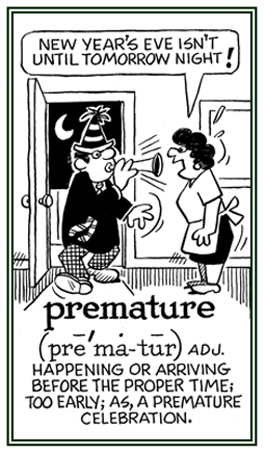pre-, prae-
(Latin: before [both in time and place])
The prefix prae- can actually be substituted for pre- because both of them are different spellings for the same prefix meaning "before".
Prehistory is succeeded by "protohistory", the period where there are some records which must still rely largely on archaeological evidence to give people a coherent account.
2. The occurrences which have lead up to a certain event or phenomenon: Grace was interested in reading more about the prehistory of capitalism, which was important for her class at school.
2. Pertaining to something which shows favour to unjustified sentiments or beliefs: Mrs. Wrong evidently had preconceived or prejudicial ideas when she gave her daughter the job, although Peter, the other applicant, was better qualified for it!
2. Pertaining to the jaw structures of marsupials prior to milk teeth: In her biology class at school, Nancy learned about the prelacteal mouth formation of kangaroos, wombats, and opossums in Australia that were thought to be traces of dentition before the first teeth appeared.
2. A contest in sports to determine the finalists in a competition: There were about ten teams competing in the preliminaries before the last contestants could be determined.
3. A minor contest that is prior to the main event: The preliminaries for the boxing competition took place before the more important and last tournament the following day.
4. An academic test that takes place before a more significant, extensive, and usually more complex examination is required: As a candidate for her degree in medicine, Joan first had to take the preliminaries in certain subjects.
2. In music, a piece that is performed before the introduction to a musical presentation, especially such a movement preceding a fugue or forming the first piece of a suite: Johann Sebastian Bach wrote some of the most beautiful preludes Brian had ever heard.
When Tracy went to the opera, she had just a minute or two to read the program before the orchestra played the prelude.
The performance by the school choir was the prelude to the president of the school board's speech on music in the schools.
3. Etymology: from Middle French prélude, "notes sung" or "played to test a voice or instrument" (1532); from Middle Latin preludium, "prelude, preliminary"; from Latin præludere, "to play beforehand for practice, to preface"; from præ-, "before" + ludere, "to play".A good education and proper training are preluding Jim to a good career.
2. To introduce a piece of music prior to a bigger composition: The pianist preluded Wilhelm Richard Wagner's opera with a short Frédéric François Chopin presentation.3. Etymology: from Latin praeludere, "to play before"; from pre-,"before" + ludere, "to play".
2. Descriptive of something that is occurring, growing, or existing before a customary, correct, or assigned time: Jerry missed his flight because it made a premature departure in order to avoid the severe storm that was approaching the area.
3. Etymology: from Latin praematurus; from prae-, "before" + maturus, "ripe."

Go to this Word A Day Revisited Index
so you can see more of Mickey Bach's cartoons.
Related before-word units: ante-; antero-; anti-; pro-.
Related "time" units: aevum, evum; archaeo-, archeo-; Calendars; chrono-; horo-; Quotes: Time; tempo-.


